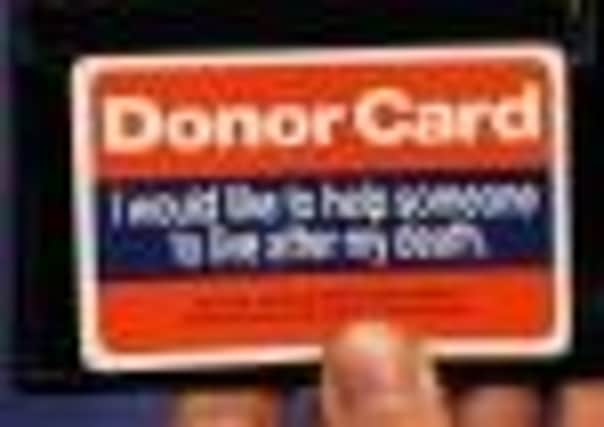Ethics chief: organ donors should have funerals paid for by NHS


Hugh Whittall, UK director of the Nuffield Council on Bioethics, dismissed suggestions that covering the cost of funeral expenses for those who sign the donor register was a way of getting around the legal ban on selling organs.
He told The Scotsman that the move would be a thank-you for an “altruistic act”.
Advertisement
Hide AdAdvertisement
Hide AdMr Whittall claimed that covering the cost of funerals would provide an “extra prompt” to “drive up” the number of organ donors, which last year was just 67 in Scotland – a rate of 13 donors per million of population.
He said the Scottish Government “shouldn’t be shy” in using TV and media adverts to publicise the idea, which he said have been widespread at university medical schools for decades in exchange for patients donating their bodies to medical science.
The director of the ethics body also denied that the move would lead to bitter rows between health boards and the families of deceased people if a patient’s donation was unsuitable for transplant.
Mr Whittall said: “It would be made perfectly clear to people that the payment of funeral costs would not be a guaranteed thing. There would be a need to explain that it would only be if an organ was suitable for donation that an offer of covering the funeral costs would be made to a family.”
He went on to say that a cap would have to be imposed on the amounts families of the deceased could bill a health board for, and that “top end” burial and cremation costs would not be covered in exchange for organ donations.
Mr Whittall, who claimed that the move would save the NHS money, said: “We’re not talking about the top end of funeral costs. If one was for £2,000 for example, we’d be able to measure that against the costs of a transplant procedure of about £17,000 or the £30,000 cost of keeping someone on dialysis. There would have to be a cap, though.
“It’s reasonable to do this to provide an extra prompt to people to donate. It’s not about selling organs. It would be a case of someone signing up as a donor and the NHS would just be meeting their funeral costs.
“It already happens where people donate their bodies to medical schools, after they have died and the responsibility for the disposal of the body remains is with the service.
Advertisement
Hide AdAdvertisement
Hide Ad“It is recognising the contribution to society for an altruistic act. The donor gets no benefit personally. Relatively few people die in circumstances where they are suitable to be donors. Most people die at home or have infections that mean they can’t give donations.
“This should all be incorporated within the existing organ donation campaign. The idea behind this would be to drive up organ donation rates and we shouldn’t be shy about this.”
Scottish Conservative health spokesman Murdo Fraser said that Scotland’s NHS was “not successful enough” in attracting organ donors.
He said: It’s an idea worth giving further consideration to, as we have to do a lot more to encourage organ donations.
“We need to have a proper debate about what’s acceptable and this might be something that would work if it was looked at carefully.”
However, the Nuffield Council’s call was rejected by Scottish ministers, with the government ruling out a change in the current practice.
A spokesperson for the Scottish Government said: “Current law makes it illegal to make any payments in exchange for organs and there are no plans to change this.
“We are committed to increasing the number of organs through other means, such as implementing the recommendations made by the UK Organ Donation Taskforce and substantially increasing investment in organ donation advertising campaigns to increase the numbers signed up to the register.”